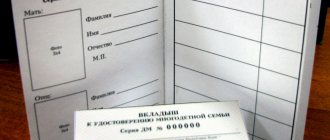People are registered not only in apartments, but also in private houses. You just need to know in advance where to go for such questions, how the registration stages go, what documents are collected and how to register without ownership rights. In addition, it is very important to study the question of how to find out about people already registered in a private house, and how much such a public service as registration in a private house costs.
Dear readers! The article talks about typical ways to resolve legal issues, but each case is individual. If you want to find out how to solve your particular problem , contact a consultant:
8 (800) 700 95 53
APPLICATIONS AND CALLS ARE ACCEPTED 24/7 and 7 days a week.
It's fast and FREE !
According to Russian legislation, a person who lives without registration for an unreasonably long period of time is required to pay a fine for failure to comply with the norms and rules for registering his place of location or residence in the region of the country.
Is it possible
The legal grounds for registration in the private sector of a city or locality in a particular municipality of the country are the provisions of the legislative sphere of the Russian Federation regarding the registration of places of stay and place of residence of citizens.
It is not possible to register in the private sector, but it is necessary if there are prerequisites and opportunities for this. The state does not limit the choice of citizens where to register - it is important that there is registration.
Thus, the main legal acts regulating the issues of registration of people in Russia are the following laws:
- Government Decree No. 713 of July 17, 1995, edited on December 23, 2016, establishing the Rules for registration and deregistration of citizens who register their place of residence/stay.
- Legislative act No. 5242-1 of June 25, 1993, last edited on April 3, 2017, revealing the rights of citizens regarding their freedom of movement throughout the country and registration of stay/residence in a specific region of the Russian Federation.
- Article 19.15.2 of the Code of Administrative Offenses of the Russian Federation, which reveals details of penalties for violating registration rules on the territory of the Russian Federation.
Based on the Rules compiled using the issued Decree No. 713, there are different concepts between different types of registrations.
Thus, Section I “General Provisions” outlines the boundaries of temporary and permanent registration of place of registration:
| Place of residence (temporary registration is issued) | this is the place registered by the citizen where he arrived for temporary stay in the country |
| Place of residence (permanent registration is required) | this is any place belonging to the housing stock of a municipal district, settlement, region, as well as the private territory of a residential premises if the property is privatized |
There are specially established time ranges between discharge and registration in a new place - only a certain number of days are given during which a person must have time to register his place of residence/stay.
Mandatory registration periods are:
| 7 days in working order | for permanent registration |
| 90 working days | for temporary registration |
You should pay attention to the number of working days, focusing on the current work schedule of the passport office at the location of the private home.
Note! The operating hours of passport offices listed on municipal websites may not correspond to actual schedules.
Therefore, to clarify the opening hours of the passport office at your location, future place of registration in the private sector of the locality, you need to call the passport service and inquire about the actual work schedule of the institution.
Fines for the fact that a citizen does not have registration are imposed when there are no grounds to challenge such a violation in court.
Fines for failure to comply with specific registration laws may be imposed in the following amounts:
| from 3,000 to 5,000 rubles for lack of residence permit (registration) in large centers | 0 Moscow and St. Petersburg |
| from 2000 to 7000 rubles for the citizen’s lack of registration as such | for absence in the passport, the unregistered citizen is fined |
| from 2000 to 7000 rubles for providing housing for an unregistered citizen for a period of more than 90 days | for illegality, the owner of the property is fined |
| from 2000 rubles | fine to the owner of a house or apartment for registering an illegal registration of a citizen on the territory of his living space (for fictitiousness) |
| from 25,000 to 50,000 rubles for violation of the regulations on registration of citizens by officials | an official is fined |
| from 250,000 to 800,000 rubles | for violation of the regulations on the registration of citizens by legal entities - the legal entity is fined |
In addition to fines, the owner who was an accomplice in the fictitious process of registering a citizen’s place of residence on the territory of his house or apartment also faces imprisonment. The term of correctional labor or imprisonment in this case is measured at 3 years.
Is it possible to register a child without the consent of the father if he is divorced? Find out in the article: is it possible to register a child without the consent of the father if he is divorced? How many days it takes to register in a new apartment is described in the link.
Registration rules
Registration is a special obligation for citizens of a country. Failure to comply will result in an administrative penalty in the form of a fine. To carry out registration, you will need to collect and submit to the Federal Migration Service at the chosen place of further residence documents for registration in a private house.
This is interesting: Ways to find out where a person is registered
Specific deadlines have been approved for registration of registration:
- permanent registration - 7 days;
- temporary registration - 90 days.
Stages of registration
The procedure for registering in a private house is quite simple; the main thing is to collect all the necessary documents for this in advance, and then decide through which organization you intend to go through the procedure.
If you act through the MFC, it will take you a little longer than if you go directly to the passport office yourself.
In general, the stages of registering a place of residence in a private house can be noted using the following algorithm of actions:
- Take a departure slip from the previous place of registration, confirming not only the fact of discharge, but also the date of this act.
- Prepare all necessary documents.
- Present all documents to the institution specialist.
- Wait for the processing time recommended by the specialist.
- Receive your passport in hand with a registration mark stamped in it, as well as a scrap book, which will also contain registration marks.
If you don’t immediately know what documents should be prepared to register your place of residence in a house, then you can clarify the list of required papers by calling the passport service, the MFC, or any housing office to which the site where the house is located is attached.
If the land plot is for agricultural purposes
If, according to the available documentation, the land has an agricultural purpose, registration will not be possible. Alternatively, you will have to change the household destination. The procedure will not take much time. If you use the help of a lawyer.
It is difficult to register a dacha building. You will have to fill out a lot of documents and put the building in order. Withstand examinations and inspections. You need to visit several authorities, which do not always look at this positively.
Required documents
Article 6 of Law No. 5242-1 dated June 25, 1993, which was last amended on April 3, 2020, lists not only the regulations on how to register the place of residence of citizens, but also what documents need to be submitted.
The package of papers should consist of the following items:
- Departure sheet from the previous place of registration.
- Passport of a citizen of the Russian Federation or a non-resident (non-citizen) of the Russian Federation.
- All documents that are title deeds for the house.
- All documentation for the land plot where the house stands.
- A house book, or an extract about the people registered in it.
- Permit papers from all home owners.
All these documents are attached to the application, which is filled out at the registration office where citizens applied for registration in a private house.
This could be the MFC, the State Services portal, or directly the territorial department of the Department of Internal Affairs, the Ministry of Internal Affairs - the passport office, which directly deals with registration procedures.
The application must necessarily reflect the following important points:
- all information about the owner of the house;
- complete information about the applicant - a person who wishes to register in the house;
- information about place of registration;
- information about the rights of third parties that the prescribed person can use.
You can fill out the application yourself if you find it on the State Services website. You can fill it out and print it out, and then bring it to the service for registration.
Or you can fill out the application form and send it electronically through the State Services website. The application is submitted in its original form, as well as the passport of the citizen who is going to register in the house.
After all procedures are completed, the passport holder comes to the institution to pick it up. Registration marks will be placed in the passport, as well as in the house register.
Owner's permission
The permission of the owner or all co-owners is necessary if it soon becomes necessary to register a person who is not directly vested with property rights in relation to such a house. The landlord's permission is a strict condition. There is only one omission from this rule: when it comes to registering minor children with their legal parents or guardians. To register a child, there is no need to obtain anyone's consent. This right is reserved for the child by law.
This is interesting: How to register in a new building: documents, registration stages
How to register in a private house without ownership rights
People can register without ownership rights when the owner of the house does not intend to share his real estate with the persons who are registered in it and who will be assigned living space in the house.
Such people simply will not have property rights, while they will have the right to legally live in a private house where they are registered without ownership rights.
Standard registration of a place of residence takes place solely with the consent of the owner of the house, and it does not imply the transfer of property or part of the property into the ownership of registered people, either now or in the future.
The transfer of property rights must always be secured by contracts - exchange, donation, purchase and sale, entry into inheritance rights and others.
A simple registration will give only a citizen the right to use the living space of the house for living. We can say that the person being registered rents a part of the house for free, which is not specifically defined as a share.
If we are talking about registering a place of residence in a private house, where there are several owners and shares of the property are distributed among them, then consent will have to be taken from all owners of the house in order to register legally.
Each owner of a part of the house must issue such permission to the registered citizen in writing. If the scrap does not belong to anyone or there is no consent of all owners of the building, then registration in such a house will be impossible; the passport office will simply refuse registration.
If there are no documents for the house
In cases where the house has not yet been completed, and it does not have all the necessary documents confirming that it is suitable for habitation, registration cannot be carried out legally.
The passport office will not accept a package of papers if it does not contain documents for the house - its plan, technical passport, house register, paper indicating the acquisition of a private residential building, and so on.
If, nevertheless, the house has suitable rooms and all conditions for living, but there are no documents yet, then registration is possible.
Only for this you need a special permit, which is issued by the housing commission, which has inspected the house and all the living conditions in it.
To this should be added the status of “residential building”, which can only be obtained when it is finally completed and meets all standards and requirements.
The concept of “construction in progress” refers to the condition of a property that does not yet meet all the standards and requirements of a residential building suitable for permanent residence.
Therefore, in the absence of documents due to unfinished construction of the house, or for other reasons (loss of documents, etc.), registration of place of residence is impossible.
Through MFC
Through the MFC (Multifunctional Center for the Provision of Public Services), registration is similar to the same procedure as described above:
- First, all the necessary documents are collected.
- Then everything is handed over to the MFC employee along with the civil passport.
- An application for registration at the place of residence is written.
- It will take some time until specialists complete the registration procedure.
- Receiving a passport and house register with stamps on them about registration in a private house.
To clarify the required package of papers, you can first obtain advice from an MFC specialist by phone.
In the countryside
If there is any completed, isolated part of the house suitable for living, then it can be considered not shared property, and therefore you can register in it without hindrance, with only the consent of the owner of the house.
In the case of registering a child under 14 years of age in a private rural house, this procedure will certainly go smoothly if the child is registered in the same house together with his parents, and not separately from them.
And only at the age of 14, the child can legally be registered separately in a private house where the parents are not registered. In this case, the child can be registered with the consent of the owner, but the discharge process will have to be completed with the consent of the guardianship authorities.
How to find out who is registered
Such information, who is registered in the house or not, is not disclosed to outsiders.
But if the house is for sale, or there are other compelling circumstances why you need to know who is registered in the house, then you just need to submit an application to the registration or accounting service.
To find out who is registered in a private home, you just need to use several different ways to obtain such information:
- Directly ask the owner of the house to look at the house register, where all the stamps on the registration of persons at the present time are affixed.
- Apply for background information in writing to the passport office.
- Obtain a certificate of registered people at the address of a private house from the MFC service.
- Obtain an extract from the housing office or the housing department of the municipal district.
Any request for such information will be made in a separate application. They can refuse registration due to a certain number of registered people only when there are too many registered people for a specific living space in a private building.
What is the price
For citizens of the Russian Federation, the service of registration in a private house is free of charge, but for non-residents of the country, non-citizens of Russia, or for persons who legally do not have any citizenship at all, the service costs 200 rubles.
This is a state duty that all non-Russian citizens must pay for the registration procedure when registering a place of residence in the country. Therefore, when registering a citizen
Russia does not issue any receipts for payment of the state duty - so be careful not to fall into the hands of unscrupulous employees of the passport office or MFC institution.
Registration in a private house, as in an apartment, may have a number of its own nuances and features. The important thing to remember is to strictly adhere to deadlines.
In order not to be late with registration, it is also mandatory to obtain consent for registration in a private property from its owner, or several owners, if any.
According to the recommendations of experts, it is best to prepare in advance all the papers necessary for the procedure for registering a place of residence in a private house.
Consolidation of loans into one at Sberbank is discussed in the article: consolidation of loans into one Sberbank. Is it possible to register a child in an apartment where the parents are not registered? Find out here.
How to register municipal land as property if you own a house, read here.








